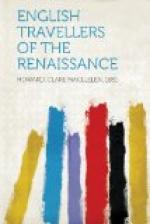Sir Henry Wotton’s letter to Milton must not be left out of account of Jacobean advice to travellers. It is brief, but very characteristic, for it breathes the atmosphere of plots and caution. Admired for his great experience and long sojourn abroad, in his old age, as Provost of Eton, Sir Henry’s advice was much sought after by fathers about to send their sons on the Grand Tour. Forty-eight years after he himself set forth beyond seas, he passed on to young John Milton “in procinct of his travels,” his favourite bit of wisdom, learned from a Roman courtier well versed in the ways of Italy: “I pensieri stretti e il viso sciolto."[199] Milton did not follow this Machiavellian precept to keep his “thoughts close and his countenance loose,” as Wotton translates it,[200] and was soon marked by the Inquisition; but he was proud of being advised by Sir Henry Wotton, and boasted of the “elegant letter” and “exceedingly useful precepts” which the Provost bestowed on him at his departure for Italy.[201]
So much for the admonitory side of instructions for travellers at the opening of the seventeenth century. Italy, we see, was still feared as a training-ground for “green wits.” Bishop Hall succeeded Ascham in denouncing the travel of young men who professed “to seek the glory of a perfect breeding, and the perfection of that which we call civility.” Allowed to visit the Continent at an early age, “these lapwings, that go from under the wing of their dam with the shell on their heads, run wild.” They hasten southwards, where in Italy they view the “proud majesty of pompous ceremonies, wherewith the hearts of children and fools are easily taken."[202] To the persuasive power of the Jesuits Hall devotes several pages, and makes an impassioned plea to the authorities to prevent Englishmen from travelling.
Parents could be easily alarmed by any possibility of their sons’ conversion to Romanism. For the penalties of being a Roman Catholic in England were enough to make an ambitious father dread recusancy in his son. Though a gentleman or a nobleman ran no risk of being hanged, quartered, disembowelled and subjected to such punishments as were dealt out to active and dangerous priests, he was regarded as a traitor if he acknowledged himself to be a Romanist. At any moment of anti-Catholic excitement he might be arrested and clapped into prison. Drearier than prison must have been his social isolation. For he was cut off from his generation and had no real part in the life of England. Under the laws of James he was denied any share in the Government, could hold no public office, practise no profession. Neither law nor medicine, nor parliament nor the army, nor the university, was open to him. Banished from London and the Court, shunned by his contemporaries, he lurked in some country house, now miserably lonely, now plagued by officers in search of priests. At last, generally, he went abroad, and wandered out his life, an exile, despised by his countrymen, who




